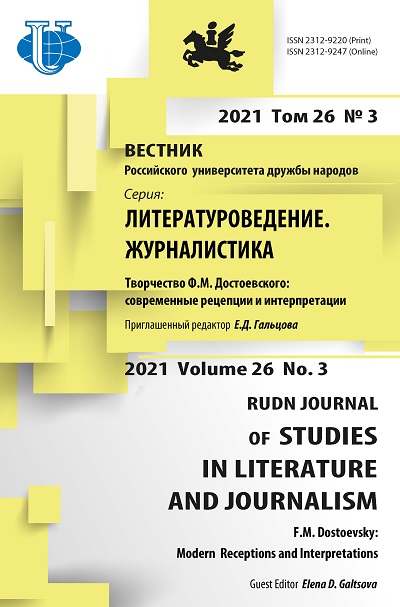The Transformation of the Idea of Internet Freedom in the XXIst Century
- Authors: Zassoursky I.I.1, Trishchenko N.D.1
-
Affiliations:
- Lomonosov Moscow State University
- Issue: Vol 26, No 3 (2021): F.M. DOSTOEVSKY: MODERN RECEPTIONS AND INTERPRETATIONS
- Pages: 546-557
- Section: JOURNALISM
- URL: https://journals.rudn.ru/literary-criticism/article/view/27656
- DOI: https://doi.org/10.22363/2312-9220-2021-26-3-546-557
- ID: 27656
Cite item
Full Text
Abstract
The article analyzes the theoretical approaches that have developed in relation to the issues of control and freedom of the Internet space, including copyright regulation and its gradual transformation as the digital environment develops and changes. Special attention is given to the values underpinning the principles of regulation are determined. If initially the dominant notion was that the Internet would ensure humanity a new free world, then later the discourse shifted to much less optimistic views and topics the issue of network regulation, technical and legal restrictions, censorship and data protection. Most recent academic literature is devoted to the practical side of the issue, and the issue of values has faded into the background. As a result, the discussion has lost significant context: issues of freedom and human rights in the Internet environment, discussion of what is really important for society - security or the absence of restrictions, the problem of users’ trust in the state and platforms.
Keywords
About the authors
Ivan I. Zassoursky
Lomonosov Moscow State University
Author for correspondence.
Email: zassoursky@gmail.com
ORCID iD: 0000-0002-2524-6168
PhD in Philology, Head of the Department of New Media and Communication Theory, Faculty of Journalism
9 Mokhovaya St, Moscow, 125009, Russian FederationNataliia D. Trishchenko
Lomonosov Moscow State University
Email: trishchenko.nataliia@yandex.ru
ORCID iD: 0000-0002-6834-6206
PhD in Philology, Senior Researcher, the Department of New Media and Communication Theory, Faculty of Journalism
9 Mokhovaya St, Moscow, 125009, Russian FederationReferences
- Proposal for a Directive 2014/27/EU of the European Parliament and of the Council on copyright in the Digital Single Market. Retrived May 3, 2020, from https://eur-lex.europa.eu/legal-content/EN/TXT/?uri=CELEX%3A52016PC0593
- McLuhan, M. (1994). Understanding Media: The Extensions of Man. New York: MIT Press.
- Castells, M. (2003). The Internet Galaxy: Reflections on the Internet, Business, and Society. 1st edition. Oxford: Oxford University Press.
- A Declaration of the Independence of Cyberspace. Retrived May 3, 2020, from https:// www.eff.org/cyberspace-independence
- Lessig, L. (1999). Code and Other Laws of Cyberspace. New York: Basic Books.
- Lessig, L. (2006). Code version 2.0. New York: Basic Books.
- Alexander, M. (2004). The Internet and Democratization: The Development of Russian Internet Policy. Demokratizatsiya The Journal of Post-Soviet Democratization, 12(4), 607-627. (In Russ.)
- Evolution of the concepts of cross-border Internet use in foreign legal doctrine. Retrived May 3, 2020, from http://inter-legal.ru/evolyutsiya-kontseptsij-transgranichnogo-ispolzova-niya-interneta-v-zarubezhnoj-pravovoj-doktrine (In Russ.)
- Reidenberg, J. (2005) Technology and Internet Jurisdiction. University of Pennsylvania Law Review, (153), 1951-1974.
- Froomkin, A. (2005). International and National Regulation of the Internet. In The Round Table Expert Group on Telecommunications Laws: Conference Papers.
- Zittrain, J. (2006). The Generative Internet. Harvard Law Review.
- Sivetc, L. (2019). State regulation of online speech in Russia: the role of internet infrastructure owners. International Journal of Law and Information Technology, 1(27), 28-49.
- Tselikov, A. (2014). The Tightening Web of Russian Internet Regulation. In Berkman Center Research Publication, 2014-2015.
- Etling, B., Faris, R., Palfrey, J., Gasser, U., Kelly, J., & Alexanyan, K. (2010). Public Discourse in the Russian Blogosphere: Mapping RuNet Politics and Mobilization (2010-2011). Berkman Center for Internet & Society of Harvard University.
- Mickiewicz, E. (2015). Piracy, policy, and Russia’s emerging media market. The Harvard International Journal of Press/Politics, 2, 30-51.
- Gehl, R. (2016). Power/freedom on the Dark Web: a digital ethnography of the Dark Web social network. New Media & Society, 18(7), 1219-1235.
- Human Rights Watch. Race to the bottom: corporate complicity in Chinese Internet Censorship. Retrived May 3, 2020, from https://www.hrw.org/reports/2006/china0806/china0806web.pdf
- Freedom on the Net 2015: privatizing censorship, eroding privacy. Retrived May 3, 2020, from https://freedomhouse.org/sites/default/files/FH_FOTN_2015Report.pdf
- Karppinen, K. (2019). Freedom Without Idealization: Non-Ideal Approaches to Freedom of Communication. Communication Theory, 1(29), 66-85.
- Turianskyi, Y. (2018). Balancing Cyber Security and Internet Freedom in Africa. Africa Portal.
- Shen, H. (2016). China and global internet governance: toward an alternative analytical framework. Chinese Journal of Communication, 9(3), 304-324.
- Powers, S., & Jablonski, M. (2016). The real cyber war: The political economy of internet freedom. New Media & Society, 18(6), 1054-1056.
- Boyle, J. (1997). Shamans, software, and spleens: law and the construction of the information society. Harvard University Press.
- Baldwin, P. (2015). The copyright wars: three centuries of trans-Atlantic battle. Princeton, New Jersey: Princeton University Press.
- Kerr, J. (2014). The Digital Dictator’s Dilemma: Internet Regulation and Political Control in Non-Democratic States. Social Science Seminar.
- European Convention on Human Right. Retrived May 3, 2020, from https://www.echr.coe.int/ Documents/Convention_ENG.pdf.
- Review of the practice of the Supreme Court of the Russian Federation 3 (2016): decisions of the ECHR. Retrived May 3, 2020, from http://europeancourt.ru/tag/roman-zaxarov-protiv-rossii. (In Russ.).
Supplementary files















